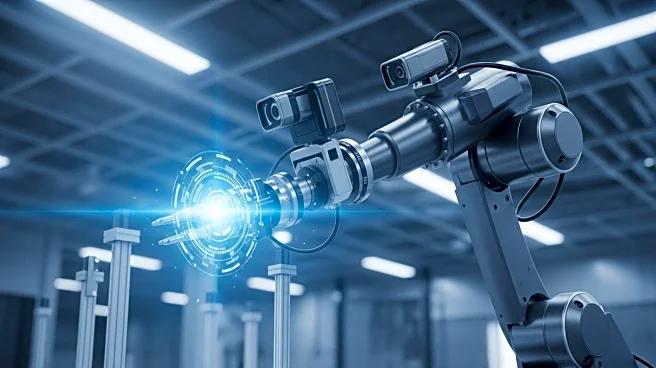What's Happening?
ABB Robotics has introduced OmniCore EyeMotion, a new technology that allows robots to adapt to complex environments in real-time using third-party cameras or sensors. This advancement enables robots to 'see' and understand their surroundings in both 2D and 3D, enhancing their autonomy and versatility. The technology is designed for ease of use, featuring a web interface that simplifies the integration of sensors and cameras. OmniCore EyeMotion is integrated into ABB's software suite, reducing commissioning time by up to 90% compared to custom solutions. This innovation is expected to transform tasks such as item sorting and quality inspection across various industries, including automotive and electronics manufacturing.
Why It's Important?
The introduction of OmniCore EyeMotion marks a significant step in ABB's pursuit of autonomous versatile robotics. By enhancing robots' sensory and perceptive capabilities, ABB is positioning itself as a leader in the robotics industry, potentially increasing efficiency and reducing operational costs for businesses. This technology could lead to faster and more accurate automation processes, benefiting sectors like logistics, packaging, and food and beverage. The ability to plan and execute collision-free paths around obstacles further enhances the robots' autonomy, potentially reducing cycle times by up to 50%.
What's Next?
ABB plans to showcase OmniCore EyeMotion at the China International Industry Fair in Shanghai, highlighting its potential applications and benefits. The company is also investing in partnerships to further develop vision AI technologies, aiming to make them faster and more intuitive. ABB's participation in RoboBusiness 2025 will provide a platform to discuss how AI is integrated across its robot portfolio, enhancing performance and adaptability. This event will also offer networking opportunities and insights into the latest robotics technologies.
Beyond the Headlines
The development of OmniCore EyeMotion reflects a broader trend towards integrating AI with robotics to achieve greater autonomy and efficiency. This technology could lead to ethical considerations regarding the displacement of human workers in industries heavily reliant on manual labor. Additionally, the increased use of AI in robotics raises questions about data privacy and security, as robots become more capable of processing and interpreting visual data.










